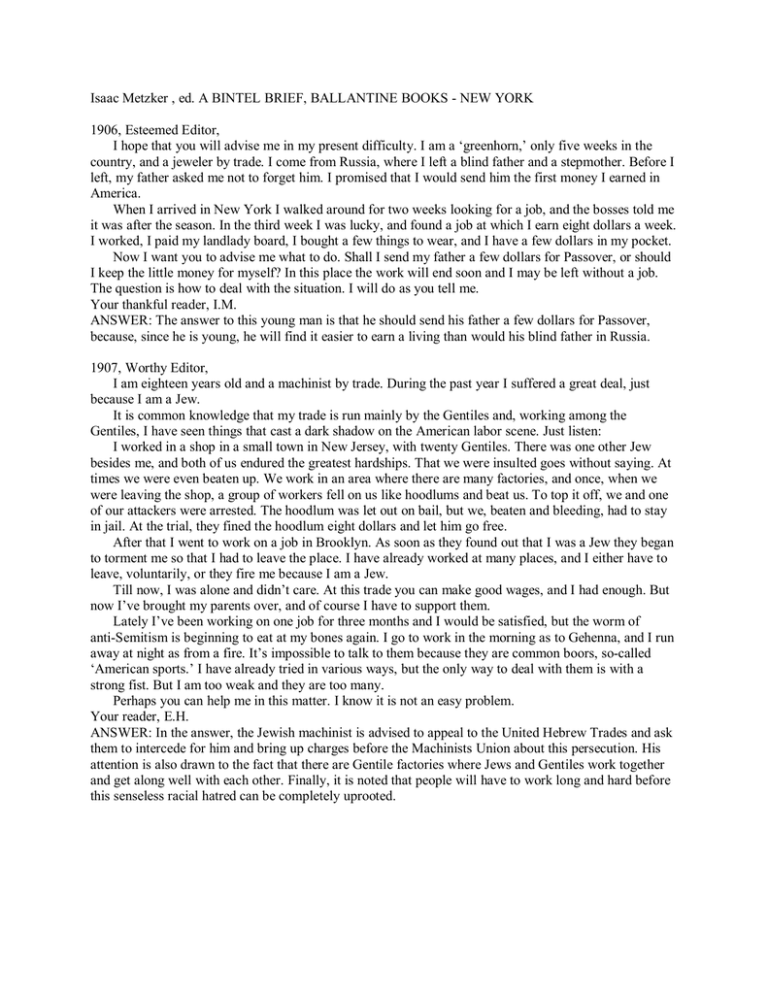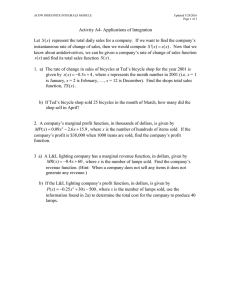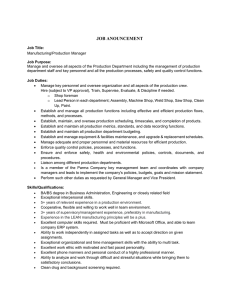Isaac Metzker , ed. A BINTEL BRIEF, BALLANTINE BOOKS -... 1906, Esteemed Editor,
advertisement

Isaac Metzker , ed. A BINTEL BRIEF, BALLANTINE BOOKS - NEW YORK 1906, Esteemed Editor, I hope that you will advise me in my present difficulty. I am a ‘greenhorn,’ only five weeks in the country, and a jeweler by trade. I come from Russia, where I left a blind father and a stepmother. Before I left, my father asked me not to forget him. I promised that I would send him the first money I earned in America. When I arrived in New York I walked around for two weeks looking for a job, and the bosses told me it was after the season. In the third week I was lucky, and found a job at which I earn eight dollars a week. I worked, I paid my landlady board, I bought a few things to wear, and I have a few dollars in my pocket. Now I want you to advise me what to do. Shall I send my father a few dollars for Passover, or should I keep the little money for myself? In this place the work will end soon and I may be left without a job. The question is how to deal with the situation. I will do as you tell me. Your thankful reader, I.M. ANSWER: The answer to this young man is that he should send his father a few dollars for Passover, because, since he is young, he will find it easier to earn a living than would his blind father in Russia. 1907, Worthy Editor, I am eighteen years old and a machinist by trade. During the past year I suffered a great deal, just because I am a Jew. It is common knowledge that my trade is run mainly by the Gentiles and, working among the Gentiles, I have seen things that cast a dark shadow on the American labor scene. Just listen: I worked in a shop in a small town in New Jersey, with twenty Gentiles. There was one other Jew besides me, and both of us endured the greatest hardships. That we were insulted goes without saying. At times we were even beaten up. We work in an area where there are many factories, and once, when we were leaving the shop, a group of workers fell on us like hoodlums and beat us. To top it off, we and one of our attackers were arrested. The hoodlum was let out on bail, but we, beaten and bleeding, had to stay in jail. At the trial, they fined the hoodlum eight dollars and let him go free. After that I went to work on a job in Brooklyn. As soon as they found out that I was a Jew they began to torment me so that I had to leave the place. I have already worked at many places, and I either have to leave, voluntarily, or they fire me because I am a Jew. Till now, I was alone and didn’t care. At this trade you can make good wages, and I had enough. But now I’ve brought my parents over, and of course I have to support them. Lately I’ve been working on one job for three months and I would be satisfied, but the worm of anti-Semitism is beginning to eat at my bones again. I go to work in the morning as to Gehenna, and I run away at night as from a fire. It’s impossible to talk to them because they are common boors, so-called ‘American sports.’ I have already tried in various ways, but the only way to deal with them is with a strong fist. But I am too weak and they are too many. Perhaps you can help me in this matter. I know it is not an easy problem. Your reader, E.H. ANSWER: In the answer, the Jewish machinist is advised to appeal to the United Hebrew Trades and ask them to intercede for him and bring up charges before the Machinists Union about this persecution. His attention is also drawn to the fact that there are Gentile factories where Jews and Gentiles work together and get along well with each other. Finally, it is noted that people will have to work long and hard before this senseless racial hatred can be completely uprooted. 1907, Dear Editor, I am one of those unfortunate girls thrown by fate into a dark and dismal shop, and I need your counsel. Along with my parents, sisters and brothers, I came from Russian Poland where I had been well educated. But because of the terrible things going on in Russia we were forced to emigrate to America. I am now seventeen years old, but I look younger and they say I am attractive. A relative talked us into moving to Vineland, New Jersey, and here in this small town I went to work in a shop. In this shop there is a foreman who is an exploiter, and he sets prices on the work. He figures it out so that the wages are very low, he insults and reviles the workers, he fires them and then takes them back. And worse than all of this, in spite of the fact that he has a wife and several children, he often allows himself to ‘ have fun’ with some of the working girls. It was my bad luck to be one of the girls that he tried to make advances to. And woe to any girl who doesn’t willingly accept them. Though my few hard-earned dollars mean a lot to my family of eight souls, I didn’t want to accept the foreman’s vulgar advances. He started to pick on me, said my work was no good, and when I proved to him he was wrong, he started to shout at me in the vilest language. He insulted me in Yiddish and then in English, so the American workers could understand too. Then, as if the Devil were after me, I ran home. I am left without a job. Can you imagine my circumstances and that of my parents who depend on my earnings? The girls in the shop were very upset over the foreman’s vulgarity but they don’t want him to throw them out, so they are afraid to be witnesses against him. What can be done about this? I beg you to answer me. Respectfully, A Shopgirl ANSWER: Such a scoundrel should be taught a lesson that could be an example to others. The girl is advised to bring out into the open the whole story about the foreman, be-?????? (missing the rest) 1908, Worthy Editor, Have pity on me and my two small children and print my letter in the Forward. Max! The children and I now say farewell to you. You left us in such a terrible state. You had no compassion for us. For six years I loved you faithfully, took care of you like a loyal servant, never had a happy day with you. Yet I forgive you for everything. Have you ever asked yourself why you left us? Max, where is your conscience: you used to have sympathy for the forsaken women and used to say their terrible plight was due to the men who left them in dire need. And how did you act? I was a young, educated, decent girl when you took me. You lived with me for six years, during which time I bore you four children. And then you left me. Of the four children, only two remain, but you have made them living orphans. Who will bring them up? Who will support us? Have you no pity for your own flesh and blood? Consider what you are doing. My tears choke me and I cannot write any more. Be advised that in several days I am leaving with my two living orphans for Russia. We say farewell to you and beg you to take pity on us and send us enough to live on. My address in Russia will be ____________ [Full name and address were given]. Your Deserted Wife and Children 1910 Dear Editor, I am an operator on ladies’ waists for the past four years and I earn good wages. I work steady but haven’t saved money, because I have a sick wife. I had to put her in the hospital where she lay for four weeks, and then I had to bring her home. Just after I brought her home, the General Strike began and I could see that I was in trouble. I had to go to the union to beg them not to let me down in my situation. I just asked for some money to have a little soup for my sick wife, but they answered that there wasn’t any money. I struggled along with my wife for four weeks, and when I saw that I might lose her I had to go back at the shop where we were striking. Now my conscience bothers me because I am a scab. I am working now, I bring home fifteen, sometimes sixteen dollars a week. But I am not happy, because I was a scab and left the union. I want to state here that I was always a good union man. Dear Editor, how can I now go back in the union and salve my conscience? I am ready to swear that I will remain a loyal union man forever. Your reader, F.H. ANSWER: Neither the operator nor the union is guilty. During the strike, thousands upon thousands of workers complained that they were in need, but at the beginning of the strike there really was no money. It is now the duty of the union to investigate the case, and if it is shown that circumstances were as the operator describes, they will certainly forgive him and he can again become a good union man. 1911. Dear Editor, I am a newsboy, fourteen years old, and I sell the Forverts in the streets till late into the night. I come to you to ask your advice. I was born in Russia and was twelve years old when I came to America with my dear mother. My sister, who was in the country before us, brought us over. My sister worked and supported us. She didn’t allow me to go to work but sent me to school. I went to school for two years and didn’t miss a day, but then came the terrible fire at the Triangle shop, where she worked, and I lost my dear sister. My mother and I suffer terribly from the misfortune. I had to help my mother and after school hours I go out and sell newspapers. I have to go to school three more years, and after that I want to go to college. But my mother doesn’t want me to go to school because she thinks I should go to work. I tell her I will work days and study at night but she won’t hear of it. Since I read the Forverts to my mother every night and read your answers in the ‘Bintel Brief,’ I beg you to answer me and say a few words to her. Your Reader, The Newsboy ANSWER: The answer to this letter is directed to the boy’s mother, whose daughter was one of the shopworkers who perished in the Triangle fire. The unfortunate woman is comforted in the answer, and she is told that she must not hinder her son’s nighttime studies but help him reach his goal. And an appeal is made to good people who are in a position to do something for the boy to come forward and help him further his education.





